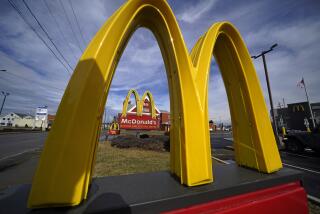Safety concerns follow E. coli outbreak
- Share via
NEW BRUNSWICK, N.J. — September’s national spinach recall has shaken consumer confidence in the safety of leafy green vegetables, according to a national survey conducted in November.
The survey, whose results are to be released today by Rutgers University, suggests that the broad recall could have lasting effects on spinach and other similar vegetables. Consumers felt uncertain and threw away other bagged produce that was not affected by the recall.
Consumers are still avoiding greens and questioning safety issues months after spinach contaminated with E. coli bacteria killed three people and sickened nearly 200.
Plummeting spinach sales have also prompted the produce industry to seek federal oversight to assure buyers that fresh produce is safe.
“We need to be in front of this to maintain consumer confidence,” said Tom Stenzel, president of the United Fresh Produce Assn., a trade group. “Consumers need to eat fresh produce and feel safe in their choices,” he said.
William K. Hallman, director of the Food Policy Institute at Rutgers in New Brunswick, N.J., called the September spinach recall -- and the E. coli contamination at Taco Bells on the East Coast three months later -- a “signal event” in the public’s perception of food safety.
“Consumers’ expectations were violated by the fact that a product they thought was clean and wholesome turned out to be something they did not expect,” he said. “It raises questions about other produce that are grown in the same way.”
The national telephone survey of 1,200 people was conducted over three weeks in November, more than six weeks after the spinach recall but before the Taco Bell outbreak. The sampling margin of error was plus or minus 3 percentage points.
Nearly 9 out of 10 consumers said they had heard about the recall, but nearly 1 in 3 said they didn’t know the recall was over.
About 1 in 5 who were aware of the recall also stopped eating other bagged produce, and 7% threw out fresh produce other than spinach during the recall. More than 75% of respondents who had spinach in their home threw it out.
More than half the people who ate spinach before the recall hadn’t returned to eating it when the survey was taken.
Uncertainty generated by the inability to quickly pinpoint the source of the contamination and the broad nature of the recall caused confusion, Hallman said.
“This has caused people to take a step back and think about what they’re eating in terms of produce, more generally than just spinach, and where it comes from,” he said.
Some consumers including Anna Blanco have yet to buy spinach or bagged salads since the recall. Before the outbreak, she bought spinach once a week.
“You don’t know if it’s going to happen again,” said Blanco, 62, as she shopped at a Whole Foods store in West Orange, N.J. “I don’t buy anything bagged.”
Sales figures through Dec. 23 from 16,000 conventional supermarkets, excluding big-box stores such as Wal-Mart and Costco, showed an overall 14% drop in spinach sales from a year earlier, according to consulting firm Perishables Group.
“The spinach contamination may have had a spillover effect to other produce items,” said Ed Mackowiak, vice president of sales for FreshLook Marketing Group.
His company’s survey of 17,000 grocery stores excluding Wal-Mart and Costco showed a nearly 17% drop in sales of bulk and bagged spinach for 2006 compared with a year earlier.
One explanation for the drop is limited supply, depleted after the recall, said Steve Lutz, executive vice president of Perishables Group.
More to Read
Eat your way across L.A.
Get our weekly Tasting Notes newsletter for reviews, news and more.
You may occasionally receive promotional content from the Los Angeles Times.









